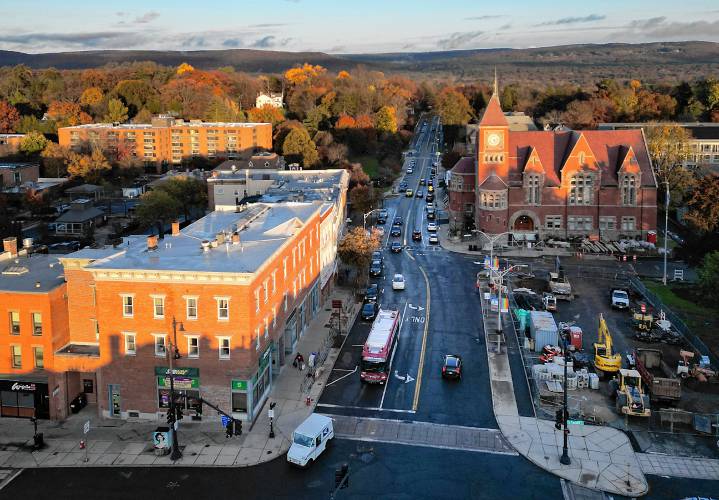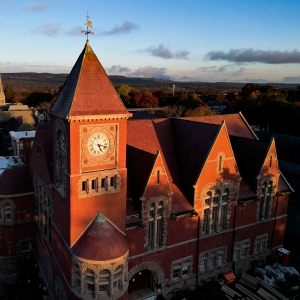Despite doubts, Amherst Town Council backs bill boosting higher ed spending

Downtown Amherst looking down Main Street toward Town Hall. STAFF PHOTO/DAN LITTLE
| Published: 02-08-2024 4:03 PM |
AMHERST — State legislation known as the Cherish Act, which would provide greater investment in public higher education and ensure more people have access to college, is being endorsed by the Town Council, even amid concerns that public K-12 education in Amherst could be facing significant cuts.
The Town Council voted 11-1 Monday in favor of a resolution supporting passage of the Cherish Act, also known as “an act committing to higher education the resources to ensure a strong and healthy public higher education system.” The resolution calls the Cherish Act “a blueprint for a world-class system of public higher education” that will “address economic, social and racial equity gaps,” meet climate change goals and support fair wages.
At-Large Council Mandi Jo Hanneke was the lone vote against the resolution, while District 3 Councilor Hala Lord was absent.
District 3 Councilor George Ryan said he understands there is worry about the Cherish Act being in conflict with Chapter 70 state aid for K-12 education, but state Sen. Jo Comerford, D-Northampton, who has filed the Cherish Act legislation, and state Rep. Mindy Domb, D-Amherst, will be among those in the Legislature who will have to wrestle with those decisions.
“I think our job here is to send a clear message to Boston that we want you to do something about this now,” Ryan said.
Hanneke said she has concerns about use of revenues from the Fair Share Amendment, also called the millionaries’ tax, going toward the Cherish Act, diverting money that wouldotherwise go toward K-12 education.
“In reading the Cherish Act, there’s a lot of money needed for it,” Hanneke said. “I have grave concerns that taking a position on that would harm our ability to argue for more money for K-12 education through the Fair Share Amendment, because they might conflict with each other due to the amount of money that appears to be needed if the Cherish Act passes.”
Still, the resolution came with an endorsement from Max Page, an Amherst resident and president of the Massachusetts Teachers Association. Page said the Cherish Act is a top priority for the 117,000 K-12 and college educators his organization represents.
Article continues after...
Yesterday's Most Read Articles
 More than 130 arrested at pro-Palestinian protest at UMass
More than 130 arrested at pro-Palestinian protest at UMass
 Public gets a look at progress on Northampton Resilience Hub
Public gets a look at progress on Northampton Resilience Hub
 Northampton bans auto dealerships near downtown; zone change won’t affect Volvo operation on King Street
Northampton bans auto dealerships near downtown; zone change won’t affect Volvo operation on King Street
 UMass basketball: Bryant forward Daniel Rivera to be Minutemen’s first transfer of the offseason
UMass basketball: Bryant forward Daniel Rivera to be Minutemen’s first transfer of the offseason
 Town manager’s plan shorts Amherst Regional Schools’ budget
Town manager’s plan shorts Amherst Regional Schools’ budget
 Police respond to alcohol-fueled incidents in Amherst
Police respond to alcohol-fueled incidents in Amherst
“There’s no way we achieve as a town or a commonwealth our racial or economic justice goals without access to both truly debt-free and high-quality public higher education,” Page said.
“Passing the Cherish Act is one of organized labor’s top priorities this year,” said Ian Rhodewalt, the community sponsor for the resolution and a field organizer for the Western Mass. Area Labor Federation.
At Large Councilor Andy Steinberg said that K-12 schools are under tremendous financial stress, partly due to the state’s Student Opportunity Act, which is providing small Chapter 70 increases. He cautioned that asking for more for public higher education, given limited resources, creates a competing priority.
But the council rejected an effort by Steinberg to postpone a vote on the resolution to Feb. 26 to get more information from Comerford and Domb and to possibly add a statement about the town valuing education at all levels. Steinberg said he is concerned that the resolution “creates the implication it’s a priority over Chapter 70.”
Others sympathized with this view. “I’m really worried about the funding, not what this act is going to do,” said District 1 Councilor Cathy Schoen.
District 5 Councilor Ana Devlin Gauthier said she is wrestling with this, too, noting that Amherst gave overwhelming support to the Fair Share Amendment when it was on the ballot, yet received little from it when the state doled out revenues from the tax.
“It is tough to reconcile the two values that many of us hold at that same time: We believe in debt-free college and we believe that our teachers need more funding, and we believe our schools need more funding,” Devlin Gauthier said.
“I absolutely appreciate some of the concerns tonight, and I don’t disagree at all,” said At Large Councilor Ellisha Walker, who co-sponsored the resolution. “I know our K-12 is in urgent need of funding, but I think multiple things can be true at the same time and it shouldn’t prevent us from addressing some of the other things that are also true.”
“If we look at the Cherish Act, I feel like it supports very important initiatives, and I think we need to sort of separate out what’s happening in terms of how we are going to pay for education in Massachusetts,” said District 2 Councilor Pat DeAngelis, another sponsor of the resolution.
Numerous people spoke about the importance of the Cherish Act, including Phyllis Keenan of Stanley Street, who said faculty and staff at community colleges are underpaid, observing that 60% of adjunct professors make less than $20,000 per year and 90% are paid under $40,000 per year.
“That is way less than the average income, and it is very hard to live in this state on that income,” Keenan said.
Stephanie Marcotte, a renter in town, said that collectively she and her husband carry over $220,000 in education debt. Without those monthly payments, money could instead be spent to own a home and pay for their daughter’s education. “If we pass the Cherish Act, other people would not have to be in my position,” Marcotte said.
Though appeals for the Town Council to add support for the Debt Free Future Act legislation to the resolution were made again, as they were in January, that is not happening yet.
Rhodewalt suggested a second resolution could be forthcoming, noting that debt-free community college is planned in fiscal year 2024, with debt-free four year colleges following. He said UMass Amherst graduates in 2023 are leaving with an average of $36,000 in student debt.
Walker said she fully supports the Debt Free Future Act. Her student debt, she said, has prevented her from buying a home in town.
Crysania Dangoor, a UMass student, said officials need to end the student debt crisis and offer free college for everyone. “It’s a huge struggle for so many of my peers here at UMass Amherst,” Dangoor said.
Reflecting on the struggles students have in paying for their education, Nicholas DeBenedectis, a sophomore at UMass, also called for support of the Debt Free Future Act.
“I feel vitriol, I feel grief, but mostly I feel hopeless,” DeBenedictis said.
Scott Merzbach can be reached at smerzbach@gazettenet.com.

 State Senate budget funds free community college for all
State Senate budget funds free community college for all ‘We can just be who we are’: Thousands show support for LGBTQ community at Hampshire Pride
‘We can just be who we are’: Thousands show support for LGBTQ community at Hampshire Pride Doors open at Tilton Library’s temporary home at South Deerfield Congregational Church
Doors open at Tilton Library’s temporary home at South Deerfield Congregational Church Area property deed transfers, May 2
Area property deed transfers, May 2
